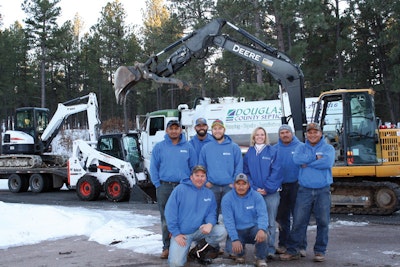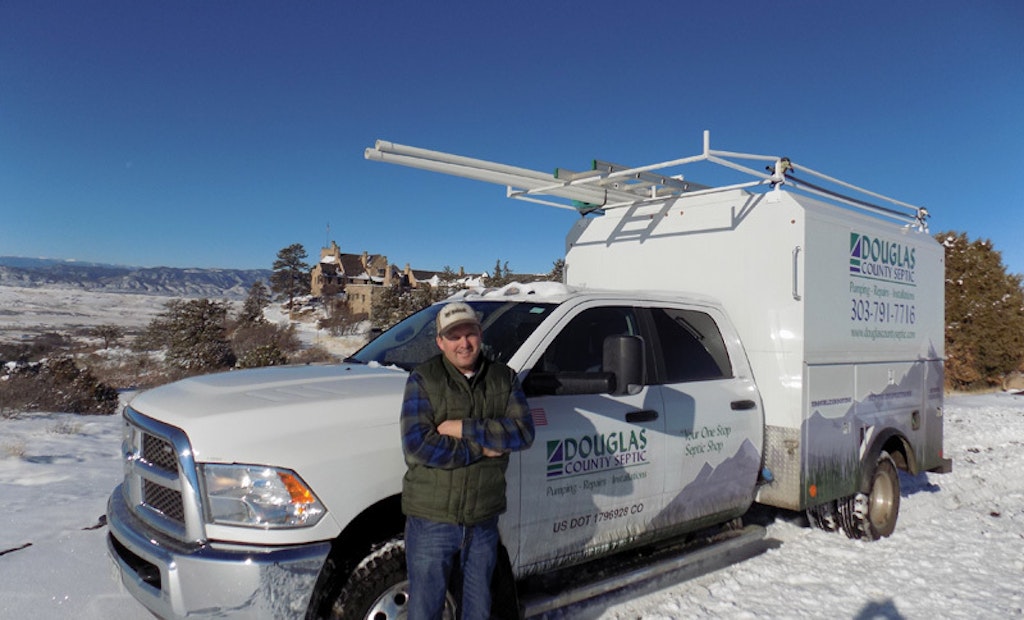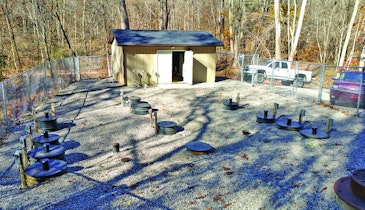Interested in Education/Training?
Get Education/Training articles, news and videos right in your inbox! Sign up now.
Education/Training + Get AlertsIn States Snapshot, we visit with a member of a state, provincial or national trade association in the decentralized wastewater industry. This time we learn about a leader in the Colorado Professionals in Onsite Wastewater.
Name: Scott Kellogg
Business name/location: Douglas County Septic – Franktown, Colorado
Age: 49
Years in the industry: 17
Association involvement:
Member of Colorado Professionals in Onsite Wastewater, served on the CPOW board as state installer representative 2015-’16, member of National Association of Wastewater Technicians, NAWT inspector certified, NAWT installer certified.
Benefits of belonging to the association:
Belonging to CPOW and NAWT allows us to stay current with state regulations, industry changes, and provides opportunity for feedback and communication with other industry professionals as well as regulatory agencies on both state and county levels.
Biggest issue facing your association right now:
Trending environmental issues are causing designers and local governmental agencies to “raise the bar,” thus increasing construction costs to homeowners for new and replacement systems. Space is limited for new and replacement systems, thus creating costly challenges for installations. Developers and building departments are not allowing enough space on properties for construction of onsite wastewater systems and need to be educated on regulation requirements encompassing the sizing, setbacks, topography and feasibility of construction of future onsite wastewater systems.
Our crew includes:
Four two-man crews and two office staff.
- Colton Mathews is a NAWT-certified inspector. He is our lead maintenance technician, title transfer inspector/vacuum truck foreman. Jason Policarpo is the vacuum truck technician.
- Efrain Jimenez is a NAWT-certified installer and is our lead installation foreman. Adrian Hernandez is our installation technician.
- Reynaldo Santos is a NAWT-certified inspector and is our lead troubleshooting and repair foreman. Manual Santos is our repair technician
- Zach Wilson is our excavation foreman, and Isidro Bocanegra is our primary equipment operator.
- Sheri Trehal is coordinator of scheduling, work orders, payroll and accounts receivable.
- Kay Kuhl is coordinator of customer service, invoicing and accounts payable.
Typical day on the job:
We have come to the conclusion that there is never a “typical day” in our world. Most days will consist of a well-thought-out and planned schedule that quickly changes in the first hour of the following day when emergencies start rolling in, or equipment breaks down or other issues arise. Phone calls and text messages begin between 6 and 6:30 a.m. communicating with employees, builders and suppliers. Generally, I will try to be on-site meeting with our foreman, reviewing jobs and laying out repairs or system installations between 7-10 a.m. Additionally, by 8 a.m. our office staff will be communicating with me, generally dealing with emergencies that came in overnight and adjusting schedules to prioritize and accommodate customers that need to be addressed before day’s end.
Running our basement excavation division also takes up a fair bit of time every day as well. I typically try for a minimum of two days per week in the office working on invoicing, estimates and project coordination. As much as many people dislike text messaging and would prefer to talk over the phone, I heavily rely on it and would be lost if it ever went away. I can be communicating with three to four employees and our office staff by a group message letting them know of a change in plans, while at the same time be texting suppliers directions or builders I’m meeting with my ETA. We rely heavily on our field technicians to text pictures of repairs they’ve completed, site conditions, and other issues that need documentation, which helps keep me from having to step foot on every single job we have going, so I can focus my energy elsewhere.
I generally spend at least an hour or two in the evenings after dinner working on bids and answering emails. I explained to someone recently: It’s like they open the gates at 6 a.m. every morning and it’s a full-out sprint like the Kentucky Derby all day long until I climb back into bed. It’s exhausting at times, but always very rewarding.
The job I’ll never forget:
A few years back we received a phone call from a health department official asking if we could assist in cleanup and removal of human waste in a backyard of a high-density residential neighborhood. An elderly lady who had mental impairments had been defecating in her backyard for an extended period of time. The health department had been getting complaints from neighbors and in turn contacted the sheriff department. After carefully planning and coordination with the sheriff and health departments, a search warrant was issued. It was almost like a sting operation, trying to elude local news channels and move our equipment onto the property and get out quickly without causing too much of a ruckus. It’s definitely a project that will not be forgotten, especially by the technicians, who are no longer with us.
My favorite piece of equipment:
I think everyone would agree our favorite piece of equipment is our mini-excavators. We have four (three Bobcat, one John Deere) ranging in size from a small 4,000-pound-class machine used primarily for exposing lids and small repairs, to our larger 19,000-pound-class machine used for deep city sewer installs and large chambered systems. Everyone can run them proficiently, they are compact enough to get in tight places, easy to mobilize, and still have the power of a rubber-tired backhoe to get the job done. Sometimes we’ll even double up on a project with two excavators to speed up the installation process.
Most challenging site I’ve worked on:
Our common niche is typically residential onsite; however, we ventured out and were awarded a replacement system for a large 120-year-old Catholic church campus. It was probably one of the most challenging installations we’ve ever completed, taking into consideration the coordination of all phases of the project, the time of year, and not being able to take the church out of service during construction.
Highlights of the project included directional boring of new mainline sewer to proper grade, demolition of existing tanks, and installation of two new large-capacity treatment tanks — one 2,000-gallon three-compartment and one 3,250-gallon three-compartment — while coping with groundwater and dewatering open holes for several days. We imported more than 3,000 cubic yards of filter sand and backfill material, installed 650 Infiltrator chambers in four separate beds as well as an irrigation ditch crossing involving pipe encasement.
This happened over six weeks during Colorado’s notorious hard freeze in January/February and required many hours of planning and coordination. Frost protection, gluing pipe, dewatering and trying to expose existing utilities in a foot or two of frozen ground are hard items to cover in a bid. The project turned out a success and met required deadlines. Taking the church off a state-permitted system and getting approval through the county level saved over $100,000 in capital cost and around $20,000 per year in O & M cost the church was incurring.
The craziest question I’ve been asked by a customer:
On several occasions we have been asked by homeowners if we can locate and retrieve diamond rings, earrings and other valuables from their septic tank. Our vacuum truck is like most of those out there, and we have not found a unique or feasible way to accomplish “finding a needle in the haystack.”
Best piece of small-business advice I’ve heard:
My belief in keeping our business successful boils down to ethics, making the right decisions and always doing the right thing no matter how difficult it is or how bad it may hurt. Like I explain to new hires with our team: “It’s taken a long time and a lot of hard work to earn a good reputation; it only takes one mishap or oversight to ruin that reputation in a matter of minutes.” Like I was taught at a very young age by my father, I believe strongly in standing behind my word and following through with promises I’ve made. If customers know you are honest and can own up to a mistake, they will no doubt be calling you back for their next project. Additionally, keeping a clean image certainly helps internally, as well as to our customers. Our technicians know they are held to a certain standard in keeping trucks and equipment clean, wearing uniforms and always performing on a professional level. This keeps morale high internally and reflects the professional image we want to portray to our customers.
If I wasn’t working in the wastewater industry, I would:
Probably be ranching or involved in the agriculture industry in some shape or form. I really enjoy working with my hands, the outdoors and the feeling of accomplishment after a hard day’s work. Oftentimes when I find myself knee deep in you know what — the Toby Keith song “Should’ve Been A Cowboy” starts playing in my head!
Crystal ball time — this is my outlook for the wastewater industry:
I strongly believe it’s going to be very important for everyone in our industry to keep up with technology and be willing to look and work “outside the box.” With all the growth we have seen in our region, we are finding more and more sites that are difficult to build on, and even more challenging to construct an onsite wastewater system on. I see challenges in our future with limited space in expanding existing systems and constructing new systems. The overall footprint of future systems will need to be smaller, and therefore filtering and advanced treatment will be key in my opinion. Designers will need to take more time to design systems that will fit the topography of the site, same as what an architect does with designing a custom home.
I also believe that O & M should be enforced harder by the regulatory agencies, with more stringent guidelines. If a property owner is not required to maintain their system, they more than likely won’t until there is a problem. By that time, it’s too late. Like I explain to many of our customers, pumping your septic tank is no different than changing the oil and filter on your car engine. If you neglect it for too long, you’ll be faced with a rebuild and it won’t be cheap. This goes hand in hand with educating the owners of onsite wastewater systems, possibly creating mandatory maintenance on their systems. If they miss a tank cleaning, maybe the “septic police” would place a padlock on a valve to prevent them from using the system until they get it serviced, similar to what happens when you don’t pay your gas or electric bill.







